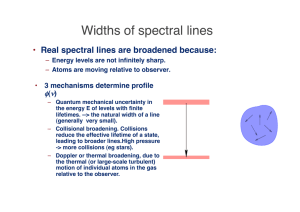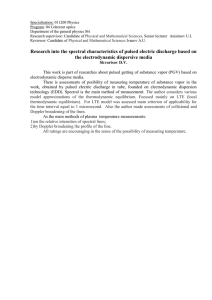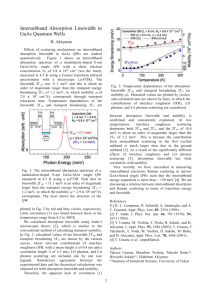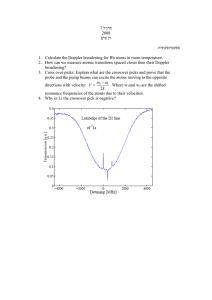Spectral Line Broadening: Natural, Collisional, Thermal
advertisement
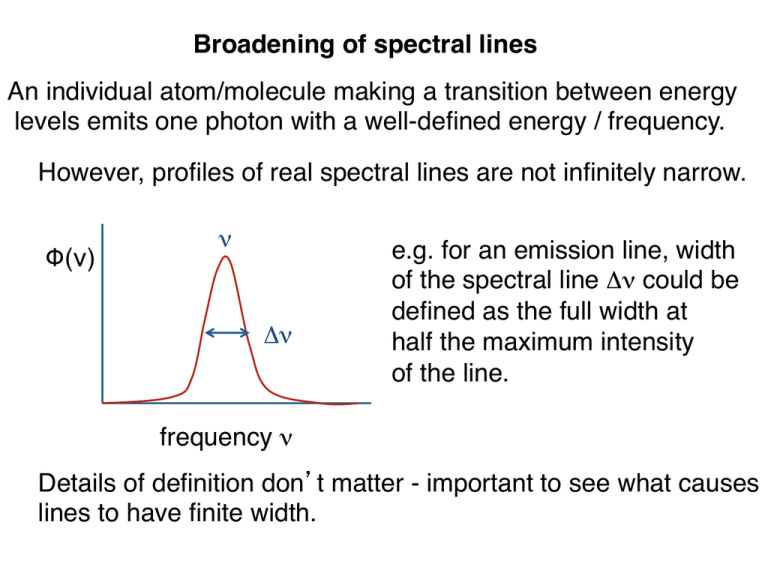
Broadening of spectral lines! An individual atom/molecule making a transition between energy! levels emits one photon with a well-defined energy / frequency.! However, profiles of real spectral lines are not infinitely narrow.! Φ(ν)! ν Δν e.g. for an emission line, width! of the spectral line Δν could be! defined as the full width at ! half the maximum intensity ! of the line.! frequency ν! Details of definition don t matter - important to see what causes! lines to have finite width.! Two basic mechanisms:! 1) Energy levels themselves are not infinitely sharp:! ! !emitted photons have a range of frequencies! 2) Atoms and molecules in the gas are moving relative ! to the observer: observed photons don t have the same ! frequency as the emitted photons because of the Doppler effect.! Natural linewidth! Consider excited state with energy ! E above the ground state.! E Ground! state! Electrons in excited state remain! there for average time Δt before ! decaying to ground state.! Uncertainty principle: energy of a level is uncertain by an amount ΔE given by:! h "E"t # 2$ But since E = hν, ΔE = hΔν! 1 "# $ 2%"t Broadening due ! to this effect is called the natural linewidth.! Natural broadening! The line has a ``Lorentz shape”, sharper peak and wider wings! than a Gaussan profile:! !" / 2# ! (" ) = 2 2 (" " " 0 ) + (!" / 2# ) 1 # Ann' !t Where Annʼ is the A-Einstein coefficient! of a transition between nnʼ and ν0 is the mean frequency! Natural linewidth sets absolute minimum width of spectral ! lines. However, normally very small - other effects dominate.! e.g. for hydrogen n=2 to n=1 transition (Lyman α transition,! ν= 2.5 1015 Hz) the lifetime is of the order of 10-9 s.! Natural linewidth is ~108 Hz.! !! " 10 #8 Compare to frequency of transition:! ! In astrophysical situations, other processes will often give! much larger linewidths than this.! Collisional broadening! In a dense gas, atoms/molecules are colliding frequently. ! This effectively reduces the lifetime of states further,! to a value smaller than the quantum mechanical lifetime.! If the frequency of collisions is νcol, then expect to get a ! collisional linewidth of about Δν ∼ νcol.! Frequency of collisions increases with density - expect to ! see broader lines in high density regions as compared to ! low density ones.! e.g. a main sequence star (small radius) has a higher density! at the photosphere than a giant of the same surface ! temperature. Spectral lines in the main sequence star will! be broader than in the giant. ! Collisional broadening! !" tot / 2# ! (" ) = 2 2 (" " " 0 ) + (!" tot / 2# ) " col !" tot = !" + # Doppler or thermal broadening! Atoms/molecules in a gas have random motions that depend ! upon the temperature. For atoms of mass m, at temperature T, ! The typical speed is obtained by equating kinetic and thermal! energy:! 1 2 mv = kbT kb = Boltzmann s const! 2 Number of atoms with given velocity is given by ! Maxwell s law. Need to distinguish between forms of this ! law for speed and for any one velocity component:! z! 2 v = v x2 + v y2 + v z2 v! y! Distribution of one component of! the velocity, say vx, is relevant for! thermal broadening - only care ! x! ! about motion along line of sight.! vx! For one component, number of atoms dN within velocity ! interval dvx is given by:! $ mv x2 ' dN(v x ) " exp& # ) dv x % 2kT ( Distribution law for speeds has extra factor of v2:! $ mv 2 ' 2 dN(v) " v exp& # ) dv ! % 2kT ( Most probable speed:! v peak ! 2kT = m Average speed:! ! v rms = v 2 = 3kT m vx! Observed at! frequency ν! Emits at! frequency ν0! Doppler shift formula:! Consider atom moving with! velocity vx along the line of! sight to the observer.! ! ! ! 0 vx = !0 c Combine this with the thermal distribution of velocities:! " (# ) = 1 $# D ' (# & # ) 2 * 0 , exp)& 2 % )( ($# D ) ,+ φ …where the Doppler width of the line:! "# D = # 0 2kT c m ν If the gas also has large-scale (i.e. not microscopic) motions! due to turbulence, those add to the width:! 12 ' # 0 $ 2kT 2 "# D = & + v turb ) ( c % m vturb is a measure of the typical turbulent velocity (note: really! need same velocity distribution for this to be strictly valid).! ! Some numbers for hydrogen:! 12 ' * "# D T $ 4.3 %10&5 ) 4 , ( 10 K + #0 ' T *1 2 "# D c $ 13) 4 , km s-1 (10 K + #0 ! larger than natural linewidth! measured in velocity units,! comparable to the sound ! speed in the gas! Doppler / thermal broadening important in many situations,! e.g. in the spectra of stars. Turbulent component only matters! when the temperature is very low / velocity high.! Closest massive ! star forming region! turbulence in gas ! has been observed! Gas distribution in part of Orion:! T = 10 - 100 K, v ~ km/s! Thermal line profile! Voigt profile: combination ! of thermal and natural (or! collisional) broadening! Doppler core! collisional linewidth! naturall linewidth! Gaussian: falls off very ! Natural line profile falls off more! rapidly away from line center! slowly - dominates wings of strong lines! Summary: ! Width of spectral lines depends upon:! • Natural linewidth (small)! • Collisional linewidth (larger at high density)! • Thermal linewidth (larger at higher temperature)! Absorption line and emission line spectra! Temperature of the Solar photosphere is ~6000K. Lots of ! spectral lines of different elements at this T.! Optical spectrum is an absorption line spectrum - see dark! absorption lines superimposed on a bright continuum.! Small section of the Solar! spectrum showing two strong! lines due to sodium. ! Absorption line spectra also seen in the spectra of distant! quasars (light comes from gas flows around black holes):! Very large number of absorbers! at different locations along the ! line of sight to the quasar.! Nebulae of different sorts typically show emission line! spectra:! Spectral lines are stronger than the continuum! Why this difference?! Use result we derived last time - consider radiation passing ! through a hot cloud of gas in thermal equilibrium:! Iν(τ)! I0! Found:! I" (# " ) = I0e $#" + B" (1$ e $#" ) Suppose no intensity entering the cloud, I0 = 0. If the cloud ! is very optically thin:! ! e"#$ % 1" # $ I$ (# $ ) = B$ (1"1+ # $ ) = # $ B$ Optical depth is related to the absorption coefficient via:! " # = $ # %s (for constant α)! Means that:! I" = # " B" $ % " B" Intensity is! large at frequencies where the absorption! coefficient is large.! For a hot gas,!absorption coefficient is large at the frequencies! of the spectral lines.! For an optically thin medium such as a nebula,! expect an emission line spectrum with large ! intensity at the frequencies where αν is large.! Summary: ! • Strength of different spectral lines depends upon the! !abundance of different elements, and on the excitation! !/ ionization state (described in part by the Boltzmann ! !formula).! • Width of spectral lines depends upon:! • Natural linewidth (small)! • Collisional linewidth (larger at high density)! • Thermal linewidth (larger at higher temperature)! High quality spectrum gives information on composition,! temperature and density of the gas.! c.f. `Modern Astrophysics section 8.1: more on thermal ! broadening, Boltzmann law, and Saha equation (version ! of Boltzmann law for ionization).!

